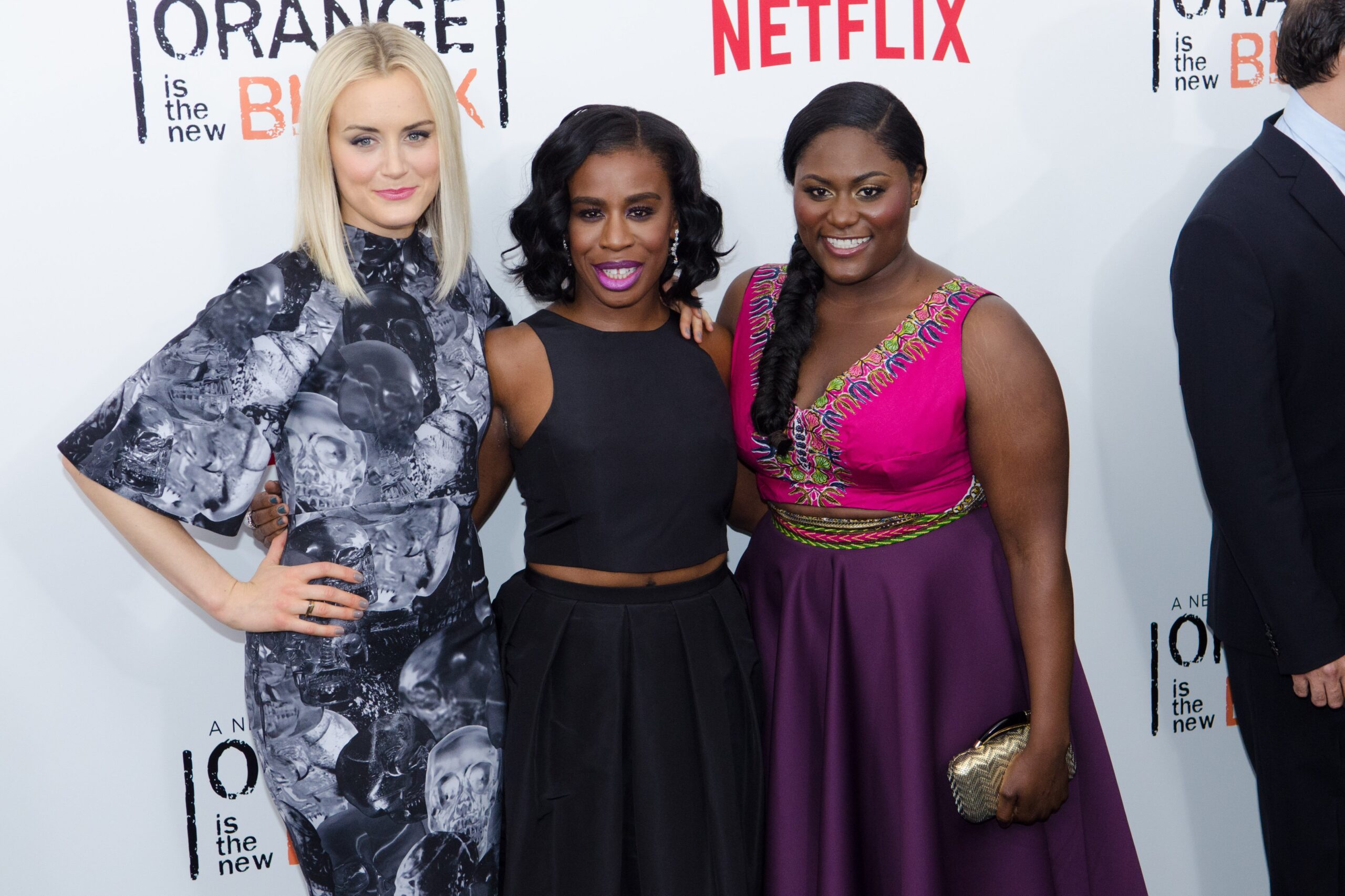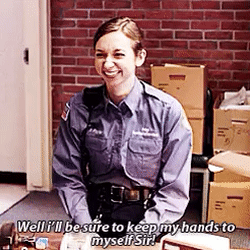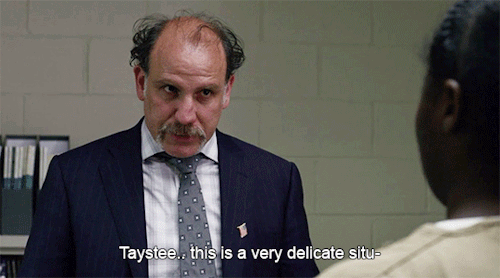
Uzo Aduba and Danielle Brooks of Orange Is The New Black
Photo by Scott Roth (Invision/AP/Shutterstock)
As Netflix’s third original series and one of its most outstanding successes, Orange Is the New Black (OITNB) was a landmark series for diverse female representation in TV.
Meanwhile, the men of Litchfield have served as sounding boards for the females’ cries of injustice—for better and for worse. The 7th and final season of Orange Is the New Black shows big ambitions to wrap up its social commentary on the big ticket issues, from immigration and prison privatization to the cycle of addiction and #MeToo reconciliation. In particular, this season Joe Caputo (Nick Sandow), the milquetoast former warden and aspiring good guy, confronts his previous inappropriate behavior towards season 2’s CO Susan Fischer (Lauren Lapkus). His #MeToo redemption arc is as heavy-handed as the series’ other closing statements, but it’s what best completes Caputo’s series-long, bumbling plight to be a better man. Does he deserve that satisfaction? As much as any of the men of OITNB deserve what they get, which is to say: sort of.

Created by Jenji Kohan (Weeds), the series has been hailed as a “pioneer” of representing diverse female, immigrant, and trans experiences. In its final season, the show also closes the book on the particular male experience represented by Joe Caputo. He vacillates between a beta male and yet another man under the Nice Guy delusion; as Salon describes, “All he’s doing is waiting for the world to give him something in return—the gold medal in exchange for heroism, the blue ribbon award for showing up.” When Fischer, a former Litchfield CO for whom Caputo developed feelings, makes a viral Facebook post about how uncomfortable she felt when an unnamed boss expressed his interest in her, Caputo feels unfairly targeted. Since his advances were akin to teenage fumblings over a crush, including inviting her to see his band (called Sideboob) perform, he argues that his good intentions set him apart from those called out in the #MeToo and #BelieveWomen movements. Of course, Caputo did use his position of authority to fire Fischer, but he argues that she was a terrible guard.
For a show that has featured genuinely malicious acts of coercion, sexual harassment, and rape by male authority figures, making Joe Caputo the target of a #MeToo accusation is the perfect move to capture the intention of the movement without virtue-signaling or making misandrist outcries. While Slate proposes that “Caputo’s reckoning with his sexual harassment of an ex-employee feels a bit like the show grappling with its own earlier miscalculations,” the character’s redemption arc is more thoughtful than that. In season 7, Caputo’s trail of failed careers leads him back to Litchfield to teach a restorative justice class to inmates, guiding them through role-play exercises and personal reflections to help them assume full responsibility for hurting their victims. It’s during one of these exercises that Caputo has an admittedly kitschy moment of self-realization. Despite his initial protests, he realizes that his actions toward Susan Fischer, however well-intended, were inappropriate and an abuse of his authority. He tells his class, “If someone comes to me and says ‘This is what you did to me,’ it’s my job to listen to them. It’s not my place to correct what they’re thinking or what they’re feeling.”
 CO Susan Fischer
CO Susan Fischer
Danielle Brooks, the actress who gives a fiercely human portrayal of Tasha “Taystee” Jefferson as both a victim of injustice and a beacon of reform, has said that she’s proud of the show for “hitting on the MeToo movement before the MeToo movement even happened or was being spoken of.” In praise of the show’s takedown of “toxic male entitlement” (whether in the form of beta male self-victimization or the Nice Guy fallacy), Salon noted, “Orange Is The New Black offers up not just an array of male experience, but an array of male frailty; the subversive mission of the show finds ways to lay bare the strength of its women as it exposes the weaknesses of the men.”
Truly, OITNB does not just depict men as flat caricatures or the ultimate root of all evil; it does something more uncomfortable than that. While outlier critics have accused Jenji Kohan’s show of spreading “irresponsible portrayals of men,” the dramedy has always relied on its cutting, self-aware humor to present even the most depraved characters as deeply flawed humans. Even season 5’s CO Piscatella (Brad William Henke), by far the series’ worst villain, was given a backstory of an abusive childhood and falling in love with a male inmate who was beaten and sexually assaulted by other prisoners because of their relationship. Prior to that, former CO Sam Healy (Michael Harney)embodied the Nice Guy who alternates between moments of genuine empathy and vindictiveness, thinly veiling his latent racism, homophobia, misogyny, and transphobia. Still, he’s given a tragic, over-the-top backstory about growing up with a mentally ill mother and bigoted father. While each man exhibits a “desperate and sad entitlement, enacted by toying with the inmates unconsciously, to either hurt or help them to his satisfaction,” they’re also sort of funny.
The series doesn’t skimp on its signature humor when it comes to toxic characters or their problematic attitudes; that simple gesture creates layers of sympathy that complicate the false dichotomies between innocence and guilt, victim and abuser, intentions and consequences.

As creator Jenji Kohan toldThe New York Times, “I believe it all goes back to the fact you’re not that worst moment in your life. I’m not saying that there are not sociopaths who might be irretrievable, but I think it’s a small percentage, and everyone else is the people who messed up.” She added, “I’m a strong believer in humor for survival. I don’t believe a drama that is 100 percent dramatic, because that’s not how we live and function as human beings. So I find it very natural to slam comedy up against tragedy, because it mirrors life.”
At the core of good comedy is empathy, and in its final season OITNB manages to sustain high notes of humor while depicting the tiny daily tragedies that come with mental illness, systemic injustice, and institutional failures. Amidst the strong women of Litchfield, Joe Caputo is the last man standing, as he’s the only recurring male character in the series with an evolved sense of self. His #MeToo redemption arc underscores the show’s point that everyone is reckoning with their past selves and their mistakes, but rehabilitation depends on one’s willingness to take responsibility for their actions. People aren’t defined by the worst moment of their lives, but they have to work to change their story.













